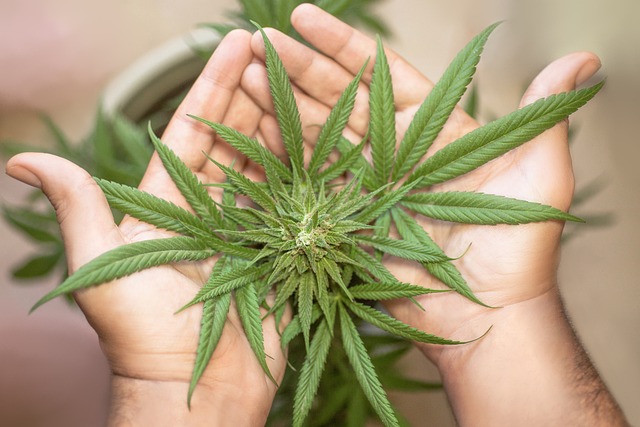The THCA flower, derived from raw cannabis plants and flowers, has garnered attention for its anti-inflammatory properties, offering a non-psychoactive alternative to traditional cannabinoids. Unlike THC, THCA does not cause psychotropic effects, making it suitable for those seeking relief without mind-altering consequences. Recent studies indicate that THCA interacts with the endocannabinoid system, which regulates pain and inflammation in the body, potentially aiding conditions like arthritis and colitis. Its anti-inflammatory effects are believed to result from the inhibition of pro-inflammatory cytokines and enzymes such as COX-2 and LOX. The THCA flower's engagement with both CB1 and CB2 receptors is thought to contribute to its efficacy, suggesting it could be an effective natural health supplement for inflammation management and overall wellness. Emerging research continues to explore the therapeutic potential of THCA flower as a non-psychoactive treatment option for inflammatory conditions.
Discover the therapeutic properties of THCA flower, a non-psychoactive cannabinoid that’s gaining attention for its potential health benefits. This article delves into the myriad ways THCA flower can support wellness, from its anti-inflammatory effects to its neuroprotective and pain-relieving properties. We explore its gastrointestinal advantages, its role as a powerful antioxidant, and how it fits within the entourage effect of cannabis compounds. With insights on legal considerations, safe usage, and dosing tips, this comprehensive guide also examines user testimonials and comparisons to other cannabinoids. Additionally, we cover cultivation practices for those interested in growing their own THCA flower, ensuring you have a well-rounded understanding of this promising wellness option.
- Unlocking the Potential of THCA Flower: An Overview
- The Science Behind THCA Flower's Anti-Inflammatory Effects
Unlocking the Potential of THCA Flower: An Overview

Delta-9-tetrahydrocannabinolic acid (THCA) is a non-psychoactive cannabinoid found in raw cannabis plants and flowers, which gains psychoactive properties when heated. The THCA flower, rich in this cannabinoid, has garnered attention for its potential therapeutic benefits, particularly its anti-inflammatory effects. Studies suggest that THCA interacts with the body’s endocannabinoid system, influencing pain and inflammation regulation. This interaction may provide relief from various inflammatory conditions without the psychoactive side effects typically associated with its counterpart, THC. Preliminary research indicates that THCA could be beneficial in managing symptoms of inflammatory diseases such as arthritis and colitis, offering a promising alternative for those seeking natural anti-inflammatory agents. Moreover, the anti-inflammatory properties of THCA are believed to stem from its ability to inhibit certain pro-inflammatory cytokines and enzymes, showcasing its potential in the realm of natural health supplements. As research continues to evolve, the full spectrum of THCA flower’s benefits may be further elucidated, potentially paving the way for innovative approaches to inflammation management and overall wellness.
The Science Behind THCA Flower's Anti-Inflammatory Effects

Delta-9-tetrahydrocannabinol acid (THCA) is the non-psychoactive precursor to the well-known compound delta-9-tetrahydrocannabinol (THC), found abundantly in cannabis flowers. THCA flower, specifically, has garnered attention for its potential anti-inflammatory effects, which are rooted in its interaction with the body’s endocannabinoid system. This system plays a crucial role in regulating various physiological processes, including pain sensation, mood, and immune responses. Studies indicate that THCA interacts with both CB1 and CB2 receptors, which are part of the endocannabinoid system, to exert anti-inflammatory effects without the psychoactive impact associated with THC.
Research has shown that THCA’s anti-inflammatory properties may be attributed to its ability to inhibit pro-inflammatory cytokines and enzymes like COX-2 and LOX, which are known to play significant roles in the body’s inflammatory response. This inhibition can potentially alleviate symptoms associated with various conditions, including arthritis and multiple sclerosis, where chronic inflammation is a hallmark. Additionally, THCA has been observed to modulate the activity of certain immune cells, such as macrophages, which are key players in the inflammatory cascade. These findings suggest that THCA flower may offer a promising natural alternative for managing inflammation, warranting further investigation into its therapeutic potential.
THCA flower offers a promising avenue for those seeking natural anti-inflammatory benefits. The insights from recent scientific studies underscore the potential of this compound, highlighting its role in supporting overall health. As an alternative to traditional therapies, incorporating THCA flower into one’s wellness regimen may provide relief and promote well-being. This exploration of THCA flower’s properties not only reveals its anti-inflammatory effects but also suggests a broader potential for this natural substance in various health applications. Users are encouraged to consult with healthcare professionals before integrating THCA flower into their routine, ensuring safe and effective use based on individual health needs and conditions.
